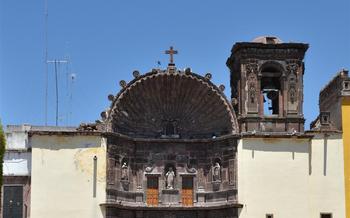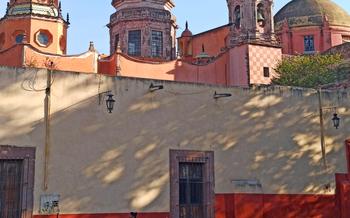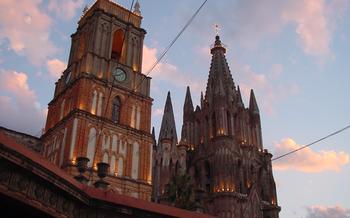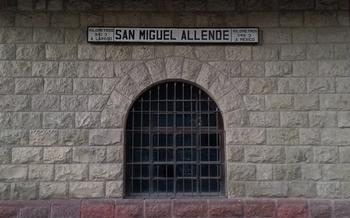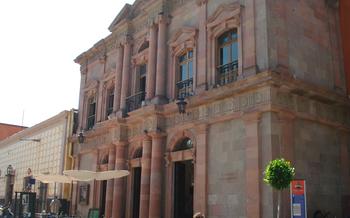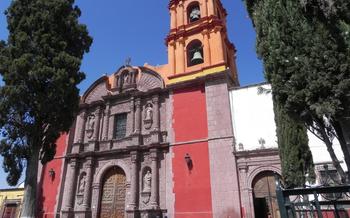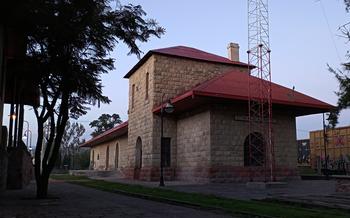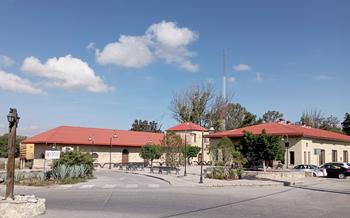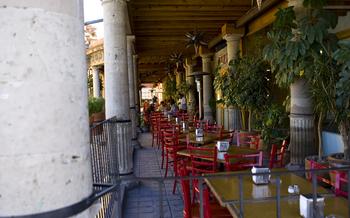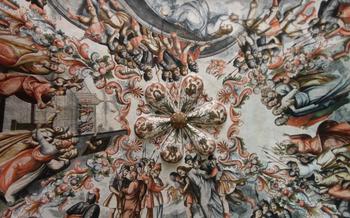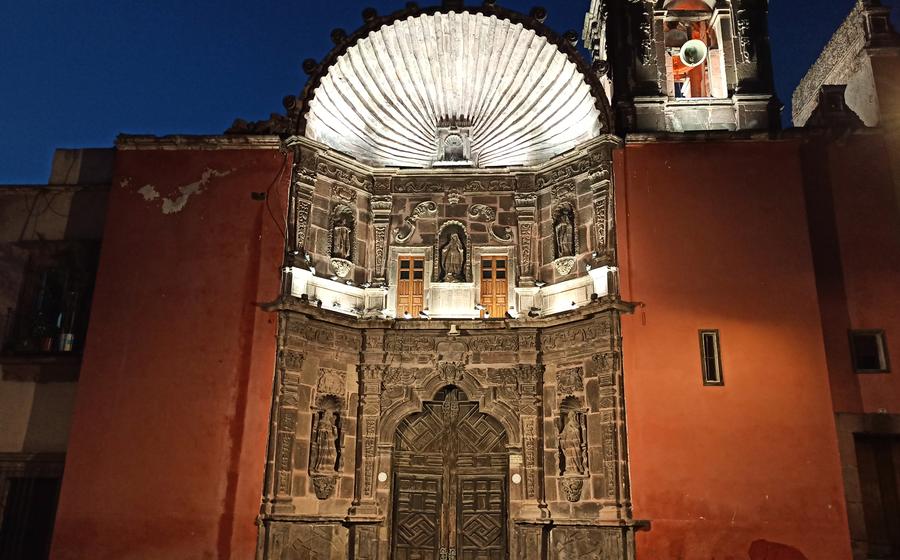
Templo de Nuestra Señora de la Salud
- The Templo de Nuestra Señora de la Salud
- Location
- Architecture
- History
- Legends
- Importance to the Local Community
- Visiting the Templo de Nuestra Señora de la Salud
- Things to Do Nearby
- Where to Eat Nearby
- Where to Stay Nearby
- Tips for Visiting
- Photography
- Souvenirs
- Insider Tip
The Templo de Nuestra Señora de la Salud
The Templo de Nuestra Señora de la Salud, also known as the Church of Our Lady of Health, is when the Spanish conquistadors arrived in the region. The church was originally built in 1554, but it was destroyed by fire in 167The current structure was rebuilt in the early 18th century and was completed in 172
The Templo de Nuestra Señora de la Salud is a beautiful example of Baroque architecture. The exterior of the church is adorned with intricate carvings and sculptures, while the interior is spacious and well-lit. The church's most striking feature is its main altar, which is made of gold and silver and is decorated with precious stones.
The Templo de Nuestra Señora de la Salud is a living testament to the faith and devotion of the people of San Miguel de Allende. It is a place of worship, prayer, and pilgrimage, and it is a source of pride for the local community.
Location
The Templo de Nuestra Señora de la Salud is located in the heart you can take a taxi or walk from the city center. The church is just a few blocks from the Jardín Allende, the main square of the city.
during the annual fiesta in honor of Our Lady of Health, which takes place on September 8th. During the fiesta, the church is decorated with colorful streamers and flowers, and there is a procession through the streets of the city.
Architecture
The Templo de Nuestra Señora de la Salud boasts a captivating blend of architectural styles, showcasing the evolution of religious art and construction techniques in Mexico. Its exterior façade is a testament to the Churrigueresque style, characterized by intricate carvings, decorative columns, and an abundance of ornamentation. The ornate portal, with its delicate reliefs and sculptures, invites visitors to enter a realm of artistic and spiritual wonder.
Stepping inside the church, one is greeted by a breathtaking interior that harmoniously merges Gothic and Neoclassical elements. The nave, with its soaring vaulted ceilings and graceful arches, creates a sense of awe and grandeur. The intricate stained-glass windows, filtering the sunlight into a kaleidoscope of colors, add a touch of ethereal beauty to the sacred space.
Among the unique features of the Templo de Nuestra Señora de la Salud is its impressive altarpiece, a masterpiece of Baroque craftsmanship. Dedicated to Our Lady of Health, the altarpiece is adorned with intricate carvings, gilded embellishments, and a life-size statue of the Virgin Mary, the patron saint of San Miguel de Allende.
Over the years, the church has undergone several restoration projects to preserve its architectural integrity and historical significance. These efforts have focused on repairing and conserving the delicate stonework, restoring the vibrant colors of the murals and paintings, and maintaining the structural stability of the building. The result is a stunning edifice that stands as a testament to the enduring legacy of Mexican artistry and faith.
History
The Templo de Nuestra Señora de la Salud was founded in the Virgin Mary. The chapel was initially built to serve the needs of the Spanish settlers and to help convert the indigenous population to Christianity. Over time, the chapel grew in size and importance, and by the 18th century, it had become one of the most important churches in San Miguel de Allende.
The church has played an important role in the history of San Miguel de Allende. It was a center of religious activity for the Spanish settlers and the indigenous population, and it was also a place of refuge during times of war and conflict. The church has survived several earthquakes and other natural disasters, and it has been restored and renovated several times over the centuries.
One of the most significant events in the history of the church was the arrival of the statue of Our Lady of Health in 173The statue, which is said to have been carved by an indigenous artist, quickly became a popular object of devotion, and it is still venerated by the people of San Miguel de Allende today.
The Templo de Nuestra Señora de la Salud is a living testament to the history of San Miguel de Allende. It is a beautiful and historic building that has played an important role in the religious, cultural, and social life of the city for over 400 years.
Legends
The Templo de Nuestra Señora de la Salud is shrouded in legends, passed down through generations by the local community. One of the most popular legends is that of the healing waters. It is said that the water from the well in the church courtyard possesses miraculous healing properties. Many people have claimed to be cured of various ailments after drinking or bathing in the water.
Another legend tells of a miraculous statue of Our Lady of Health. According to legend, the statue was found by a group of shepherds in a cave near the church. The statue was brought to the church and placed on the altar, where it is said to have performed many miracles.
One of the most chilling legends is that of the ghost of the priest. It is said that the ghost of a priest who was murdered in the church still haunts the premises. The ghost is said to appear in the church at night, wearing a blood-stained cassock.
Finally, there is the legend of the hidden treasure. It is said that a treasure of gold and jewels is hidden somewhere in the church. Many people have searched for the treasure, but no one has ever found it.
Importance to the Local Community
The Templo de Nuestra Señora de la Salud has served as a religious and cultural center, bringing people together and shaping the identity of San Miguel de Allende.
Religious significance: The church is a symbol of faith and devotion for the predominantly Catholic population of San Miguel de Allende. Many residents consider Our Lady of Health to be their patron saint and seek her intercession in times of need.
Cultural significance: The Templo de Nuestra Señora de la Salud is an integral part of the city's cultural heritage. Its unique architecture, artwork, and legends have made it a beloved landmark and a source of pride for the local community.
Social significance: The church serves as a gathering place for community events, celebrations, and festivals. It is a place where people come together to share their traditions, strengthen their bonds, and celebrate their faith.
Economic significance: The Templo de Nuestra Señora de la Salud is a significant tourist attraction, drawing visitors from around the world. This influx of tourism generates revenue for local businesses and contributes to the city's economy.
Visiting the Templo de Nuestra Señora de la Salud
The Templo de Nuestra Señora de la Salud is open to the public daily from 9am to 6 Nuestra Señora de la Salud, you can expect to see a beautiful and historic building that is still an important part of the local community. You can learn about the history and legends of the church, and you can admire its stunning architecture. You can also take a moment to pray or meditate in the peaceful atmosphere of the church.
If you are visiting San Miguel de Allende, the Templo de Nuestra Señora de la Salud is a must-see. It is a beautiful and historic building that is still an important part of the local community. You can learn about the history and legends of the church, and you can admire its stunning architecture. You can also take a moment to pray or meditate in the peaceful atmosphere of the church.
Things to Do Nearby
San Miguel de Allende is a vibrant city with plenty to see and do. In addition to visiting the Templo de Nuestra Señora de la Salud, here are a few other things you can do nearby:
-
Visit the Mercado de Artesanías: This lively market is a great place to find handmade crafts, souvenirs, and local produce. You can also find a variety of food stalls serving up traditional Mexican dishes.
-
Take a cooking class: Learn how to cook delicious Mexican food from scratch in a hands-on cooking class. Many cooking schools in San Miguel de Allende offer classes for all levels, from beginners to experienced cooks.
-
Visit the Museo Histórico de San Miguel de Allende: This museum tells the story of San Miguel de Allende, from its founding to the present day. The museum features exhibits on the city's history, culture, and art.
-
Hike up to the Mirador del Chorro: This viewpoint offers stunning views of the city and the surrounding countryside. The hike to the viewpoint is relatively easy and takes about 30 minutes.
Where to Eat Nearby
San Miguel de Allende offers a wide range of dining options, from traditional Mexican cuisine to international fare. Here are some recommendations for places to eat near the Templo de Nuestra Señora de la Salud:
-
Traditional Mexican food:
- El Patio: A charming restaurant with a courtyard setting, serving traditional Mexican dishes made with fresh, local ingredients.
- La Sirena Gorda: A popular spot for seafood lovers, serving up delicious fish tacos, ceviche, and aguachiles.
- El Fogón: A family-run restaurant specializing in home-style Mexican cooking, with a menu that changes daily based on what's fresh and in season.
-
International cuisine:
- The Restaurant: A fine-dining restaurant with a focus on modern European cuisine, using locally-sourced ingredients.
- La Brasserie: A French bistro serving classic dishes such as coq au vin and steak frites, along with a selection of French wines.
- The Mission: A trendy restaurant with a global menu, serving up dishes inspired by flavors from around the world.
-
Budget-friendly options:
- Tacos El Pata: A local favorite for tacos al pastor, served with a variety of salsas and toppings.
- La Gordita: A small, no-frills restaurant serving up delicious gorditas, a type of thick corn tortilla filled with various meats and vegetables.
- La Esquina del Pan: A bakery and cafe serving up fresh bread, pastries, and sandwiches, as well as affordable breakfast and lunch options.
-
Fine dining:
- Quince: A world-renowned restaurant known for its innovative Mexican cuisine, using seasonal ingredients and modern techniques.
- Moxi: A fine-dining restaurant with a focus on molecular gastronomy, offering a unique and unforgettable dining experience.
- The Restaurant at Rosewood San Miguel de Allende: A luxurious restaurant located in the heart of San Miguel de Allende, serving up modern Mexican cuisine with a sophisticated twist.
Where to Stay Nearby
When visiting the Templo de Nuestra Señora de la Salud, there are a variety of accommodation options to choose from in the surrounding area. For a luxurious stay, consider the Rosewood San Miguel de Allende, a five-star hotel located just a few blocks from the church. The hotel features elegant rooms and suites, a rooftop pool, and a world-class spa.
For a more budget-friendly option, try the Hotel Casa de la Cuesta, a charming hotel located in a historic building. The hotel offers comfortable rooms and suites, as well as a rooftop terrace with stunning views of the city.
If you're looking for a unique accommodation experience, consider staying at the Casa de los Milagros, a boutique hotel housed in a former convent. The hotel features beautiful rooms and suites, as well as a courtyard garden and a rooftop terrace.
For those who prefer to stay in an apartment, there are a number of options available on Airbnb and other rental websites. This can be a great option for families or groups who want more space and privacy.
No matter what your budget or preferences, you're sure to find the perfect place to stay near the Templo de Nuestra Señora de la Salud.
Tips for Visiting
Be respectful of the local culture and customs. Dress modestly when visiting the church, and be sure to remove your hat before entering. It is also important to be aware of your surroundings and take precautions against petty theft.
Dress modestly when visiting the church. This is a place of worship, so it is important to dress respectfully. Avoid wearing shorts, tank tops, or other revealing clothing.
Be aware of your surroundings and take precautions against petty theft. San Miguel de Allende is a relatively safe city, but petty theft is still a problem. Be sure to keep your valuables close at hand, and avoid walking around alone at night.
Learn a few basic Spanish phrases to communicate with the locals. This will help you to get around and ask for directions. Many people in San Miguel de Allende speak English, but it is always helpful to know a few basic Spanish phrases.
Photography
The Templo de Nuestra Señora de la Salud is a photographer's dream, with its intricate facade, colorful tiles, and stunning interior. The best spots for taking photos are from the front of the church, where you can capture the full grandeur of the building, and from the inside, where you can photograph the beautiful stained glass windows and altar.
To take great photos of the Templo de Nuestra Señora de la Salud, use a wide-angle lens to capture the entire building. For interior shots, use a tripod to keep your camera steady and avoid blurry photos. And don't forget to use the natural light to your advantage. The best time to photograph the church is in the morning or late afternoon, when the light is soft and golden.
Once you've taken your photos, you can edit them to make them even more stunning. Use a photo editing software to adjust the colors, contrast, and brightness, and to remove any unwanted elements from the photos. You can also add filters to give your photos a unique look.
Once you're happy with your photos, share them with the world! Post them on social media, or create a blog post or photo album about your trip to San Miguel de Allende.
Souvenirs
Where to Buy Souvenirs
The Templo de Nuestra Señora de la Salud has a small gift shop where you can purchase a variety of souvenirs, including religious items, postcards, and books. You can also find souvenirs at the many shops and stalls in the surrounding area.
What to Buy
Some popular souvenirs from the Templo de Nuestra Señora de la Salud include:
- Religious items, such as statues, rosaries, and candles
- Postcards and prints of the church
- Books about the history and architecture of the church
- Traditional Mexican crafts, such as pottery, textiles, and jewelry
Tips for Bargaining
When bargaining for souvenirs, it is important to be respectful and polite. Start by offering a fair price, and be prepared to walk away if the seller is not willing to negotiate. It is also important to be aware of the local customs and traditions when bargaining.
Packing Your Souvenirs
When packing your souvenirs, be sure to wrap them carefully to protect them from damage. You should also declare any valuable items to customs when you return home.
Insider Tip
For an unforgettable experience, plan your visit to coincide with the annual fiesta in honor of Our Lady of Health, held on September 8th. This vibrant celebration draws thousands of pilgrims and locals alike, who come to pay homage to the patron saint of San Miguel de Allende. Witness colorful processions, traditional dances, and lively music fill the streets, creating a festive atmosphere that showcases the city's rich cultural heritage. Join in the merriment and immerse yourself in the profound devotion and joy that characterize this special event. Remember to arrive early to secure a good spot to witness the procession and soak in the infectious energy that permeates the city during this time.
